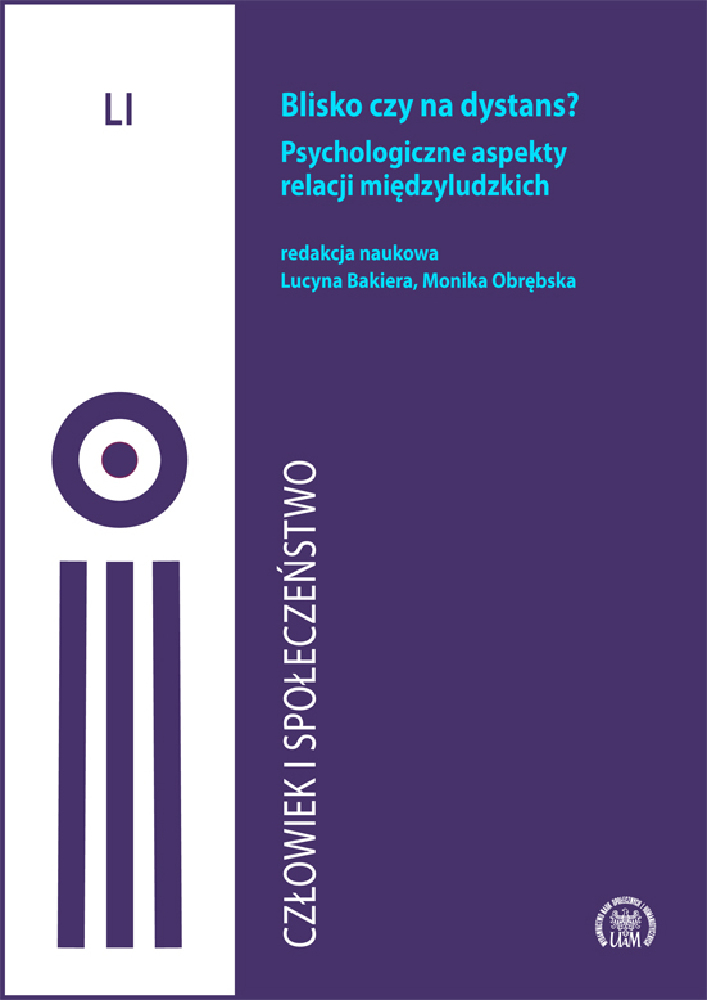Abstrakt
Interpersonal communication is a dynamic, complex process, and is conditioned by many factors, among which one of the most important roles is played by the personality of interaction partners. The article presents results of research on the influence of extraversion and emotional intelligence on selected aspects of communication when the process is mediated by the Internet. The study involved young adults (N = 51) aged 21–27 (M = 24.27; SD = 1.65; Md = 24), mostly women (Nk = 26; K/M = 1.08), who responded to the invitation to the study published on Facebook. The survey was conducted in the period from December 2019 to February 2020, through Messenger and GoogleForms to collect the results in personality questionnaires. On the basis of the correlation coefficients obtained, it can be assumed that the level of extraversion (r = .397, p = .002; r = 414, p < .001 and the level of emotional intelligence (r = .331, p = .009; r = .411, p < .001) may be responsible for the expression of emotions and productivity of the speech in an intermediary conversation. Due to the results of the conducted research, we put forward a thesis that the mediation of contact with another person thanks to the currently developed systems of smileys, does not lead to impoverishment of the emotional layer of the message.
Bibliografia
Błachnio, A. (2007). Przegląd wybranych badań nad wpływem Internetu na dobrostan psychiczny i kontakty społeczne użytkowników. Psychologia Społeczna, 3–4(5), 225–233.
Chang, S., Hecht, B., Johnson, I., Miller, H., Terveen, L., Thebault-Spieker, J. (2016). Blissfully Happy or Ready to Fight: Varying Interpretations of Emoji. International AAAI Conference on Web and Social Media 2016.
Churches, O., Keage, H., Kohler, M., Nicholls, M., Thiessen, M. (2014). Emoticons in mind: An event-related potential study. Social Neuroscience, 9(2), 196–202.
Dobek-Ostrowska, B. (2004). Podstawy komunikowania społecznego. Wrocław: Astrum.
Dobek-Ostrowska, B. (red.). (1998). Współczesne systemy komunikowania. Wrocław: Wydawnictwo Uniwersytetu Wrocławskiego.
Gałuszka, A., Probierz, E. (2018). Problematyczne używanie Internetu a cechy osobowości i wczesne nieadaptacyjne schematy użytkowników sieci. Annales Universitatis Paedagogicae Cracoviensis. Studia de Cultura, 10(4): Cyberpsychologia. Nowe strategie badania mediów i ich użytkowników.
Grzenia, J. (2007). Komunikacja językowa w Internecie. Warszawa: Wydawnictwo Naukowe PWN.
Hall, J.A., Pennington, N. (2013). Self-monitoring, honesty, and cue use on Facebook: The relationship with user extraversion and conscientiousness. Computers in Human Behavior, 29(4), 1556–1564.
Harwas-Napierała, B. (2006). Komunikacja w rodzinie. Poznań: Wydawnictwo Naukowe Uniwersytetu im. Adama Mickiewicza.
Jaworowska, A., Matczak, A. (2001). Kwestionariusz inteligencji emocjonalnej INTE. Warszawa: Pracownia Testów Psychologicznych Polskiego Towarzystwa Psychologicznego.
Lipińska-Grobelny, A. (2008). Wybrane determinanty stylów zachowań komunikacyjnych przedstawicieli handlowych. Roczniki Psychologiczne, 11(1), 105–126.
Majchrzyk, Ł. (2018). Liczba użytkowników Facebooka, Instagrama i Messengera w Polsce (11/2018). https://mobirank.pl/2018/12/04/liczba-uzytkownikow-facebooka-instagrama-i-messengera-w-polsce-11-2018/ (dostęp: 16.05.2019).
Nęcka, E., Orzechowski, J., Szymura, B. (2006). Psychologia poznawcza. Warszawa: Wydawnictwo Naukowe PWN.
Podgórecki, J. (2000). Komunikacja społeczna. Opole: Instytut Nauk Pedagogicznych Uniwersytetu Opolskiego.
Saklofske, D.H., Austin, E.J., Minski, P.S. (2003). Factor structure and validity of a trait emotional intelligence measure. Personality and Individual Differences, 34(4), 707–721.
Bralczyk, J. (red.). (2005). Słownik 100 tysięcy potrzebnych słów. Warszawa: Wydawnictwo Naukowe PWN.
Stewart, J. (2007). Mosty zamiast murów. Podręcznik komunikacji interpersonalnej. Warszawa: Wydawnictwo Naukowe PWN.
Van der Zee, K., Thijs, M., Schakel, L. (2002). The relationship of emotional intelligence with academic intelligence and the Big Five. European Journal of Personality, 16(2), 103–125.
Licencja
1. W momencie złożenia pracy celem rozpoczęcia postępowania w sprawie publikacji, Licencjodawca, zwany dalej Autorem, akceptuje wszystkie zasady umieszczone na stronie internetowej czasopisma “Człowiek i Społeczeństwo”, udzielając Licencjobiorcy, zwanego dalej Wydawcą, niewyłącznej i nieodpłatnej licencji na korzystanie z Utworu. Licencja zakłada tym samym brak ograniczeń terytorialnych, czasowych oraz ilościowych na następujących polach eksploatacji (art. 50 ustawy z dnia 4 lutego 1994 r. o prawie autorskim i prawach pokrewnych):
a. utrwalanie Utworu;
b. zwielokrotnienie Utworu drukiem i w wersji cyfrowej;
c. wprowadzenie do obrotu, użyczenie lub najem oryginału/zwielokrotnionych egzemplarzy Utworu;
d. publiczne wykonanie, wystawienie, wyświetlenie, odtworzenie oraz nadawanie i reemitowanie, a także publiczne udostępnianie Utworu w taki sposób, aby każdy mógł mieć do niego dostęp w miejscu i w czasie przez siebie wybranym;
e. włączenie Utworu w skład utworu zbiorowego;
f. wprowadzenie Utworu w postaci elektronicznej na platformy elektroniczne lub inne wprowadzenie Utworu w postaci elektronicznej do Internetu, Intranetu, Extranetu lub innej sieci;
g. rozpowszechnianie Utworu w wersji elektronicznej w Internecie, Intranecie, Extranecie lub innej sieci, w pracy zbiorowej, a także samodzielnie w formule Open Access w oparciu o licencję Creative Commons Uznanie autorstwa 4.0 Międzynarodowa Licencja Publiczna (CC BY 4.0), a także inną wersję językową tej licencji, lub którąkolwiek późniejszą wersję tej licencji.
2. Założenia licencji Creative Commons Uznanie autorstwa 4.0 Międzynarodowa Licencja Publiczna (CC BY 4.0), udzielają Wydawcy upoważnienia do kopiowania, zmieniania, rozprowadzania, przedstawiania i wykonywania Utworu jedynie pod warunkiem uznania autorstwa.
3. Wraz z dostarczeniem Utworu, Autor zobowiązuje się do wypełnienia, podpisania oraz odesłania skanu umowy

